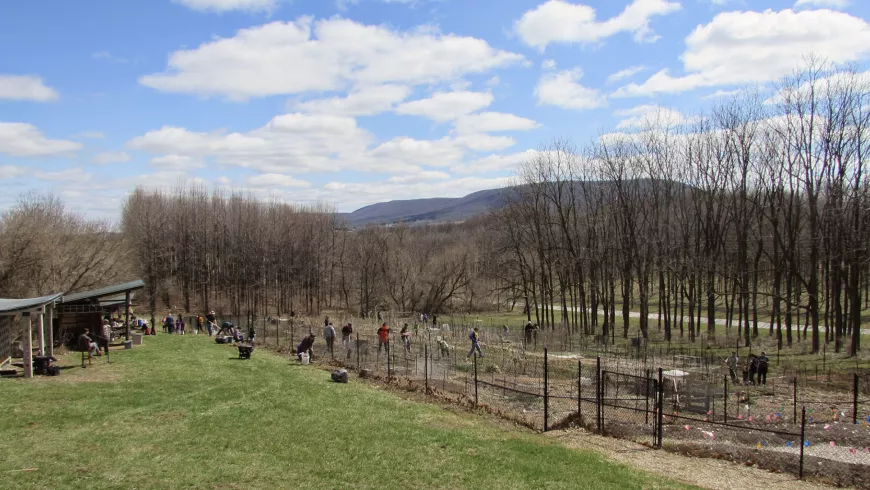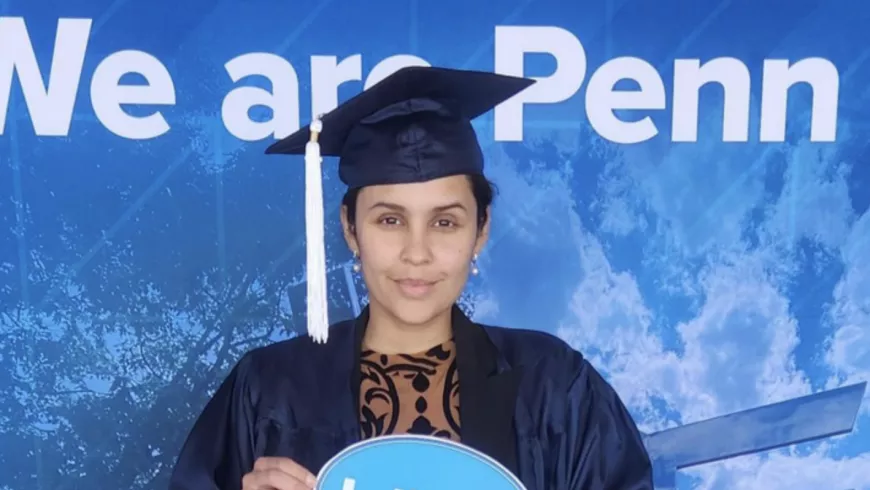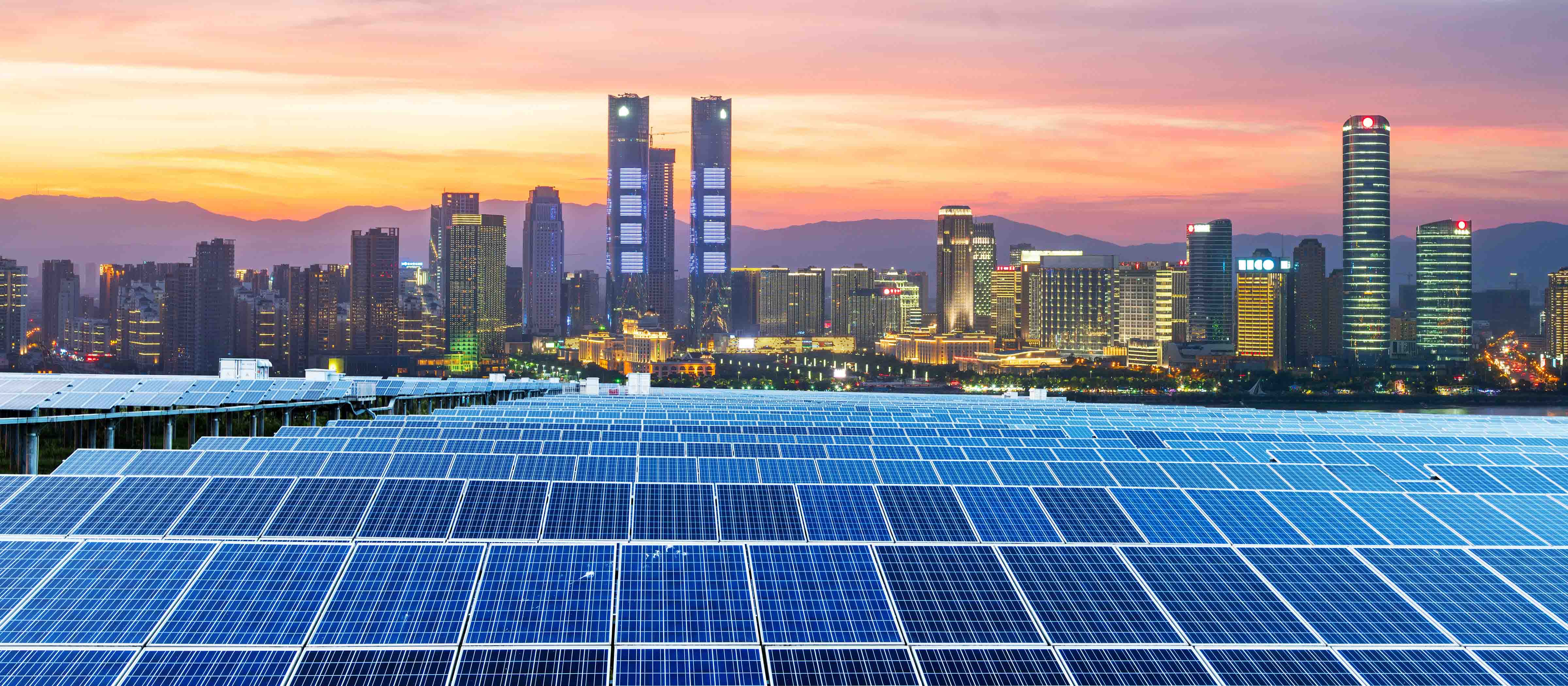100% Online
Complete your Penn State course work at your own pace and 100% online.
Application deadline
Credits and costs
Stackable Credentials
This program is embedded within the Master of Professional Studies in Renewable Energy and Sustainability Systems.
Gain Skills to Move Renewable Energy Projects Forward
Evaluate solar energy systems using techno-economic, performance, and/or cost/benefit analyses, including multi-parameter dynamic simulation tools.
Use the principles of solar energy science, including resource availability, resource intermittency, renewable energy technologies, and options for solar energy conversion systems.
Identify stakeholder preference for solar goods and services in a given locale and solar industry.
Evaluate project development and/or sustainability decisions in the broader context of society's interests.
Online Solar Energy Courses
Online Solar Energy Courses
The courses in this graduate certificate program can help you gain the solar energy systems project development skills and real-world knowledge that many companies will require from their sustainability and solar professionals.
To prepare you for these opportunities, our curriculum covers a breadth of topics, including:
full systems perspective of a solar energy project, including financial policies and analysis tools required for development and implementation
design tools, solar policies, financing tools, and factors affecting the short-term and lifecycle costs of solar energy systems
physical qualities of the solar resource, estimation of the fractional contributions of irradiance to total demand, and economic assessment of the solar resource
power production from solar energy conversion, including conversion via photovoltaics
theories and design practices of solar electric systems in the context of utility and commercial-scale applications
solar resource assessment for selected locales
effective communication techniques to maximize the solar economic utility to clients/stakeholders
electric-derived solar conversion technologies
technical information about hybridized solar energy systems design
the social and policy context of solar energy systems project design
Required Courses (12 credits)
- 3credits
Theories and practices of solar electric systems, including component selection, performance simulation, grid interconnection, codes, and design documentation.
- 3credits
Economic analysis of solar energy projects, including project development process, energy policies, finance methods, and economic analysis tools.
- 3credits
Methods, economic criteria, and meteorological background for assessing the solar resource with respect to solar energy conversion technologies.
- 3credits
Technical and theoretical background for utility-scale solar energy conversion technologies to generate electric power.
Using Stackable Certificate Credits toward a Master’s Degree
As part of the stackable pathway, the courses required for this 12-credit certificate can apply to the Master of Professional Studies in Renewable Energy and Sustainability Systems if you apply and are accepted into the program. If you have been accepted into this certificate program, you will not be charged an additional fee to apply for the Master of Professional Studies in Renewable Energy and Sustainability Systems program.
Courses may also apply to other degree programs. Students should contact their adviser to discuss transfer credit policies and application fees and details.
Students earn the graduate certificate by successfully completing each course with a grade of C or better; however, students must earn a grade of B- or better to apply those successfully completed courses toward the master’s degree.
Course Availability
If you're ready to see when your courses will be offered, visit our public LionPATH course search (opens in new window) to start planning ahead.
Start or Advance Your Sustainable Energy Career

Start or Advance Your Sustainable Energy Career
You can use the knowledge gained from this program and the support of Penn State career resources to pursue careers in a variety of fields, depending on your goals.
Career Opportunities for Graduates
Solar power is a key piece of the growing "green economy." Rapid growth in the science and practice of solar energy has given rise to the need for advanced understanding in resource assessment, project development, system design, and emerging technologies for solar electric systems.
As employment opportunities continue to expand, organizations will look for professionals who can develop, manage, and improve solar energy systems through project development, system design and analysis, and process improvement.
By successfully completing the course work for the Graduate Certificate in Solar Energy, you could qualify for such leadership positions as:
- solar energy project manager
- solar PV design engineer
- VP of business development in a commercial solar sector
- solar research analyst
- project engineer in solar energy
Career Services to Set You Up for Success

From the day you're accepted as a student, you can access resources and tools provided by Penn State World Campus Career Services to further your career. These resources are beneficial whether you're searching for a job or advancing in an established career.
- Opportunities to connect with employers
- Career counselor/coach support
- Occupation and salary information
- Internships
- Graduate school resources
Ready to Learn More?
Get the resources you need to make informed decisions about your education. Request information on this program and other programs of interest by completing this form.
Ready to take the next step toward your Penn State graduate certificate?
Costs and Financial Aid
Costs and Financial Aid
Learn about this program's tuition, fees, scholarship opportunities, grants, payment options, and military benefits.
Costs and Financial Aid
Graduate Tuition
Graduate tuition is calculated based on the number of credits for which you register. Tuition is due shortly after each semester begins and rates are assessed every semester of enrollment.
2024–25 Academic Year Rates
| How many credits do you plan to take per semester? | Cost |
|---|---|
| 11 or fewer | $1,027 per credit |
| 12 or more | $12,325 per semester |
2025–26 Academic Year Rates
| How many credits do you plan to take per semester? | Cost |
|---|---|
| 11 or fewer | $1,037 per credit |
| 12 or more | $12,448 per semester |
Paying for Your Certificate
Students pursuing a certificate are considered "nondegree," a status that is not eligible for federal student aid, including the Federal Direct Stafford Loan program. A private alternative loan may be an option to consider.
Additionally, Penn State offers many ways to pay for your education, including an installment plan and third-party payments. Penn State World Campus also offers an Employer Reimbursement and Tuition Deferment Plan. Learn more about the options for paying for your education.
Students pursuing a degree and meeting all other eligibility requirements may qualify for financial aid.
Military Benefits
Military service members, veterans, and their spouses or dependents should explore these potential military education benefits and financial aid opportunities, as well.
Additional Cost of Attendance Details
To view the detailed list of cost of attendance elements:
- visit the Tuition Information site
- click the plus sign to expand the table
- select a semester from the World Campus row
Technical Requirements
Review the technical requirements for this program.
Earn Stackable Credentials on the Way to a Master's Degree

Earn Stackable Credentials on the Way to a Master's Degree
This certificate can serve as a stand-alone credential and as a step on your journey toward the Penn State Master of Professional Studies in Renewable Energy and Sustainability Systems. Stackable credentials recognize your new skills and knowledge while you work toward your master's degree — with no additional application fees.
Earning graduate certificates from Penn State World Campus is a great way to gain new skills and quickly add valuable credentials to your résumé.
This graduate certificate’s courses satisfy requirements toward the following degree:
Learn to leverage technical expertise and project development skills to successfully implement renewable energy systems and sustainable business policies through the courses offered in this online degree program.
Learn more about the Master of Professional Studies in Renewable Energy and Sustainability SystemsWho Should Apply?
If you are a current or aspiring professional with a background in systems science, engineering, or physics and are seeking the progressive skills needed to advance the solar energy sector — this program is for you.
Set Your Own Pace

Set Your Own Pace
Whether you are looking to finish your program as quickly as possible or balance your studies with your busy life, Penn State World Campus can help you achieve your education goals. Many students take one or two courses per semester.
Our online courses typically follow a 12- to 15-week semester cycle, and there are three semesters per year (spring, summer, and fall). If you plan to take a heavy course load, you should expect your course work to be your primary focus and discuss your schedule with your academic adviser.
To Finish Your Certificate in Less than a Year
- Take 3–4 courses each semester
To Finish Your Certificate in One Year
- Take 2–3 courses each semester
To Finish Your Certificate in Two Years
- Take 1 course each semester
Timelines may vary based on course availability.
Convenient Online Format
This program's convenient online format gives you the flexibility you need to study around your busy schedule. You can skip the lengthy commute without sacrificing the quality of your education and prepare yourself for more rewarding career opportunities without leaving your home.
A Trusted Leader in Online Education

Penn State has a history of more than 100 years of distance education, and World Campus has been a leader in online learning for more than two decades. Our online learning environment offers the same quality education that our students experience on campus.
Information for Military and Veterans

Are you a member of the military, a veteran, or a military spouse? Please visit our military website for additional information regarding financial aid, transfer credits, and application instructions.
How to Apply to Penn State

How to Apply to Penn State
Apply by April 20 to start May 19
Application Instructions
Deadlines and Important Dates
Complete your application and submit all required materials by the appropriate deadline. Your deadline will depend on the semester you plan to start your courses.
Summer Deadline
Apply by April 20 to start May 19Fall Deadline
Apply by July 20 to start August 25Spring Deadline
Apply by December 10, 2025, to start January 12, 2026
Steps to Apply
For admission to the J. Jeffrey and Ann Marie Fox Graduate School, an applicant must hold either (1) a baccalaureate degree from a regionally accredited U.S. institution or (2) a tertiary (postsecondary) degree that is deemed comparable to a four-year bachelor's degree from a regionally accredited U.S. institution. This degree must be from an officially recognized degree-granting institution in the country in which it operates.
You will need to upload the following items as part of your application:
Official transcripts from each institution attended, regardless of the number of credits or semesters completed. Transcripts not in English must be accompanied by a certified translation. If you are a Penn State alum, you do not need to request transcripts for credits earned at Penn State but must list Penn State as part of your academic history.
English Proficiency— The language of instruction at Penn State is English. With some exceptions, international applicants must take and submit scores for the Test of English as a Foreign Language (TOEFL) or International English Language Testing System (IELTS). Minimum test scores and exceptions are found in the English Proficiency section on the Fox Graduate School's "Requirements for Graduate Admission" page. Visit the TOEFL website for testing information. Penn State's institutional code is 2660.
GRE and GMAT test scores are NOT required.
To begin the online application, you will need a Penn State account.
Create a New Penn State Account
If you have any problems during this process, contact an admissions counselor at [email protected].
Please note: Former Penn State students may not need to complete the admissions application or create a new Penn State account. Please visit our Returning Students page for instructions.
Stackable Credentials Application Fee Waiver
If you have been previously accepted to a program with stackable credentials, you will not be charged an additional application fee for any associated programs.
Associated programs in the renewable energy and sustainability systems stack include:
Certificates:
- Graduate Certificate in Sustainable Energy Development
- Graduate Certificate in Energy Transition Strategies
- Graduate Certificate in Solar Energy
- Graduate Certificate in Sustainability Management and Policy
Degree:
- Master of Professional Studies in Renewable Energy and Sustainability Systems
If you begin with a certificate and are interested in pursuing the Master of Professional Studies in Renewable Energy and Sustainability Systems, work with your adviser while completing your first certificate to determine which program to apply to next.
Up to 15 credits earned in any of these certificate programs may be transferred to the master's degree in renewable energy and sustainability systems, subject to restrictions outlined in GCAC-309 Transfer Credit.
You can begin your online application at any time. Your progress within the online application system will be saved as you go, allowing you to return at any point as you gather additional information and required materials.
- Choose Enrollment Type: "Degree Admission"
- Choose "WORLD CAMPUS" as the campus
Checking Your Status
You can check the status of your application by using the same login information established for the online application form.6. Complete the application.
Admissions Help
If you have questions about the admissions process, contact an admissions counselor at [email protected].
Contact Us

Contact Us
Have questions or want more information? We're happy to talk.
Our Student Services and program specialists are available now to help you with your application and to answer any questions you have about our graduate programs in Renewable Energy and Sustainability Systems (RESS). Please contact us with anything you wish to discuss.
Noelle Capparelle, MPS-RESS Program Assistant
Email: [email protected]
Phone: 814-867-5401
For general questions about Penn State World Campus, please contact:
World Campus Admissions Counselors
Phone: 814-863-5386
Email: [email protected]
Learn from the Best
Learn from the Best
The Graduate Certificate in Solar Energy is developed by Penn State's Department of Energy and Mineral Engineering and delivered through Penn State World Campus. Our courses are taught by distinguished faculty who have special training and experience teaching in an online environment.
To see more detailed information about the renewable energy and sustainability systems portfolio, visit the RESS program website. You can also visit the Open Educational Resources website to preview the courses offered online by the Department of Energy and Mineral Engineering.
Faculty
Mark Fedkin
- DegreePh.D., Geo-Environmental Engineering, Penn State
- DegreeM.S., Geo-Environmental Engineering, Penn State
- DegreeB.S., Geology, Moscow State University (Russia)
Dr. Mark Fedkin is an assistant teaching professor and a lead faculty member in the renewable energy and sustainability systems graduate online program. He has worked for more than ten years for the Earth and Mineral Sciences Energy Institute, where he led experimental research on electrochemical energy systems and processes, including fuel cells, hydrogen technologies, electrophoresis, and corrosion in extreme environments. During his career as an experimentalist, Dr. Fedkin developed a number of methods and technologies for monitoring and sensing the environmental parameters in both simulated and natural settings.
Erich Schienke
- DegreePh.D., Science and Technology Studies, Rensselaer Polytechnic Institute
- DegreeM.S., Science and Technology Studies, Rensselaer Polytechnic Institute
- DegreeB.A., Technology Studies, Hampshire College
Dr. Erich Schienke's research and teaching interests are in the areas of energy policy, renewable energy systems design and implementation, ethical dimensions of renewable energy and sustainability systems, sustainability indicators, ESG, and workforce requirements needed to meet the demands of the rapidly growing renewable energy industry. He has published in multiple peer-reviewed journals and edited volumes, which have received more than 250 citations across a range of topics, including climate risk management, ethics and sustainability, and ecological governance.
Mohamed Amer Chaaban
- DegreePh.D. Candidate, Electrical Engineering, University of North Carolina-Charlotte
- DegreeM.S., Architectural Engineering, University of Nebraska-Lincoln
- DegreeB.S., Electrical Engineering, Damascus University
Mohamed Amer Chaaban is an adjunct instructor for the RESS graduate online program at Penn State. He is the author and instructor of AE 868. He worked for AEP and RGS Energy, one of the nation's top solar power companies, as a solar design engineer. During his work, he designed thousands of residential and dozens of large commercial solar systems combined with more than 20 megawatts in capacity. He is an advocate of sustainability and of making solar affordable for all humans in the world.
Mark D. Kleinginna
- DegreeMPS, Renewable Energy Systems and Sustainability, Penn State
- DegreeM.A., Economics, Penn State
- DegreeB.S., Economics, Penn State
Mark D. Kleinginna is interested in the entire continental energy topology, including research and expert testimony in rate making, electricity transmission, renewable energy systems, decarbonization of the built environment, and thermal energy networks.



